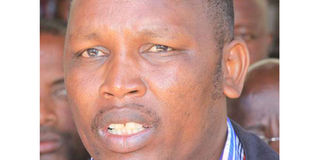Samburu fails to meet revenue targets for the second year in row

Samburu Governor Lati Lelelit says the plan is to increase school enrolment
Samburu County has failed to meet its revenue targets for the second straight fiscal year, a report from the controller of budget shows.
In the first nine months of 2021/22, Samburu generated Sh85.38 million in own-source revenue, which was 56.9 per cent of the annual targets. Its target was at least Sh150 million.
But the controller of budget noted that the amount collected was slightly higher than the Sh50.54 million raised in 2020/2021.
Own-source revenue refers to money generated by the county from local sources such as property and entertainment taxes and other charges authorised by an Act of Parliament.
"In the first nine months of the financial year 2021/22, the County generated a total of Sh85.38 million as own-source revenue, which was 56.9 per cent of the annual target,” the report says.
“This amount represented an increase of 68.9 per cent compared to Sh50.54 million realised during a similar period of 2020/21.
"The growth can be attributed to the relatively improved tourist visits that have contributed a more significant share of the county’s own source revenue over the years."
Controller of budget Margret Nyakang'o also castigated Samburu for not implementing an automated Own Source of Revenue (OSR) collection system.
The report also shows that the money Samburu spent on salaries and other personal emoluments was almost thrice that used for development.
While the recommended ceiling for personal emoluments in Regulation 25 (1) (b) of the Public Finance Management (County Governments) Regulations, 2015, is 35 per cent, the report shows Samburu hit 37 per cent.
The report shows that Samburu spent a whopping Sh1.7 billion on recurrent expenditure in the first nine months of 2021/2022, while using only Sh604.05 million on development programmes.
"The wage bill of Sh1.77 billion includes Sh656.64 million attributable to the health sector, which translates to 37.1 per cent of the total wage bill in the reporting period," the report says.
Ms Nyakang’o also faulted Samburu for processing Sh255 million worth of salaries manually, contrary to the law, raising concerns about oversight pitfalls. The manual payroll amounted to 15.9 per cent of the total personal emoluments, according to the report.
She said manual payments violate the law that requires county governments to use the prescribed Integrated Payroll Personnel Database (IPPD), which is not prone to abuse.
"Personnel emoluments amounting to Sh1.35 billion were processed through the IPPD system, while those paid through [the] manual payroll [amounted to] Sh255.17 million,” the report says.
“The government policy is that salaries should be processed through the IPPD system, and the county is advised to fast-track the acquisition of personal numbers for their staff."
The IPPD system protects the payroll from duplications and other inefficiencies commonly found in manual management.
Samburu spent Sh18.48 million on committee sitting allowances for 28 MCAs and the Speaker against an annual budget allocation of Sh26.40 million. The report indicates that the average monthly sitting allowance was Sh73,320 per MCA against the Salaries and Remuneration Commission’s (SRC) recommended monthly ceiling of Sh124,800.
In the period under review, expenditure on domestic travel amounted to Sh150.23 million and comprised Sh55.22 million spent by the county assembly and Sh95 million by the county executive. Spending on foreign travel amounted to Sh15.36 million and consisted of Sh9.59 million by the assembly and Sh5.78 million by the executive.
New Samburu Governor Jonathan Lelelit wants to audit the workforce as part of efforts to eliminate ghost workers and address the burgeoning wage bill. He said this will clean up the payroll and purge ghost workers who are earning from the comfort of their homes.
“I have inherited a wage bill crisis. The past administration employed too many staff with most being ghost workers. I believe a comprehensive cleansing will weed out anomalies and ghosts that are earning public money without even setting foot in the office," he said.





